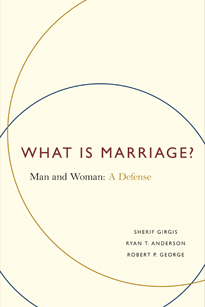This past week I’ve been speaking to different groups about gay marriage. I confess that I don’t actually enjoy talking about this topic, but as a resident theologian, I’m inevitably asked to help groups of pastors and churches come to some conclusion on this matter. It’s a big issue in Australia as it has been in the USA and UK. This week a senate motion to recognize same-sex marriages performed overseas was defeated in the Australian senate. But the issue is not going to go away any time soon, especially when it is treated a justice issue for the LGBT community and when the media is overwhelmingly behind it.
 The best thing I’ve read on the topic is by Sherif Girgis, Ryan T. Anderson, and Robert P. George, What is Marriage? Man and Woman: A Defense (New York: Encounter, 2012). I strongly recommend this book! The authors argue that the debate is not about homosexuality, but about the definition of marriage. They contend that marriage is a comprehensive union of a man and a woman. Marriage is not simply the recognition of one’s emotional attachments, long-term sexual partner, or domestic situation. Instead, it is rooted in a sexual ecology of the complementarity between men and women and is oriented towards family. Or, as I would say, marriage is for partnership, procreation, and the promotion of family. They point out the legal absurdities that emerge if marriage is defined as anything other than such a union between a man and a woman. For instance, if marriage is simply the government’s recognition of one’s emotional attachments, there is nothing to say that marriage must be between only two persons, be permanent, and be exclusive. In fact, I would say, given this definition of marriage, a same sex marriage is no more a marriage than a Big Mac is a Falafel.
The best thing I’ve read on the topic is by Sherif Girgis, Ryan T. Anderson, and Robert P. George, What is Marriage? Man and Woman: A Defense (New York: Encounter, 2012). I strongly recommend this book! The authors argue that the debate is not about homosexuality, but about the definition of marriage. They contend that marriage is a comprehensive union of a man and a woman. Marriage is not simply the recognition of one’s emotional attachments, long-term sexual partner, or domestic situation. Instead, it is rooted in a sexual ecology of the complementarity between men and women and is oriented towards family. Or, as I would say, marriage is for partnership, procreation, and the promotion of family. They point out the legal absurdities that emerge if marriage is defined as anything other than such a union between a man and a woman. For instance, if marriage is simply the government’s recognition of one’s emotional attachments, there is nothing to say that marriage must be between only two persons, be permanent, and be exclusive. In fact, I would say, given this definition of marriage, a same sex marriage is no more a marriage than a Big Mac is a Falafel.
At the same time, I recognize that in the west Christendom is over. We live in largely post-Christian, secular, and pluralistic contexts. As such trying to impose Christian ethics on people who are not Christians is like trying to push a round peg through a square hole. Therefore, I think we should get government out of marriage and religion out of state regulated relationships. I propose that Australia, the UK, and USA adopt a European model whereby everyone and anyone gets a civil union to recognize the legal status of their relationship, but marriage becomes an exclusively religious rite that is unregulated and non-recognized by the government. In practice that would mean, on Friday you go to your town hall and get the local magistrate to issue you with a civil union, then on Saturday you go to your church or synagogue and have a marriage ceremony. On the government’s view, only Friday matters as a legal contract between two parties, and marriage has the same legal status as baptisms and confirmations. The advantage of this model is that it provides liberty to the state to sanction relationships with legal benefits and rights for both parties, it ensures the religious liberties of churches who don’t have to perform rites or sanction relationships that they don’t want to, and it means that churches do not have to act of agents of the state in performing civil marriages.
On an interesting point, wrestling with the matters of the church, marriage, culture, and law is not new. Let me give an example. Bishop Callistus I of Rome (d. ca. 223) encountered the problem of what to do with a number of women from the senatorial class converting to Christianity. The problem was that Christian noblewomen outnumbered the Christian noblemen. A Christian woman belonging to the “clarissima” had three options when it came to marriage. First, she could marry a pagan man of the same social status, but this would mean a mixed marriage and lead inevitably to apostasy as it would be incumbent upon her to adopt the religion of her husband. Second, she could marry a Christian of lower station, and thereby forfeit her status as a Roman noblewoman, but that was hardly an attractive option with its loss of social position. Third, she could live in concubinage with a socially inferior Christian, like a freedman or a slave, without being legally married. Callistus chose the third option, concubinage, as an alternative to mixed marriages or the social decline of Christian women, neither of which were in the interests of the church. I think the story of Callistus I shows that when it comes to marriage, law, and culture, we can be confronted with problems not of our own making, and we often have to choose between the lesser of two non-ideal situations.











